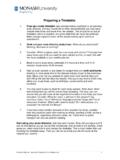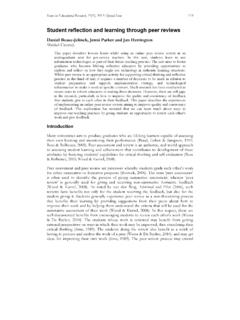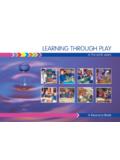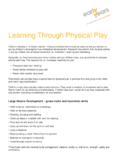Transcription of Learning effectively through Groupwork - …
1 Communicating and Learning in Engineering Online Resources 1 Learning effectively through Groupwork These guidelines provide an overview of three main aspects of Groupwork . These are: 1. Working as a team overview of why Groupwork is important 2. Stages in group development forming, storming, norming, performing and mourning 3. Roles in groups important behaviors in effective teams An excellent reference for more information about working in teams and groups is: McGourty, J & DeMeuse, KP 2001, Team developer: an assessment and skill building program, John Wiley & Sons. 1. Working as a team Many Engineering units involve projects and investigations that are undertaken by small teams or groups of about 4 or 5 students.
2 Why work in teams? There are several good reasons: Engineers work in teams, so it's good to develop these skills as early as possible. Research shows that we all learn effectively from each other. Hence, your teams should be Learning teams, with the focus on helping each other to learn. Teams are much more effective than individuals for work on complex projects. Teamwork develops your interpersonal skills in coping with conflict, in being a chairperson, in developing your interdependence and accountability and in developing your sense of self esteem. This aids your personal development and your non-work-related relationships. Effective teams Why do some groups accomplish very little, while others achieve much more?
3 This difference stems very much from the processes within the group - its inner dynamics or workings. The features of an effective team include: combined group effort of all members clear goals group members focused on Learning mutual trust and support open communication democratic processes. Making the most of your team There are many advantages of working collaboratively with other students. To make the most of your experience as a team member, remember to: Become actively. Don't wait for another team member to do all the work. Share - open communication and the contribution of ideas and information is essential for successful and highly performing teams.
4 Learn to work cooperatively. The success of your team will depend on helping each other. Respect your fellow team members. Be aware that each team member will have unique talents and ways of Learning . Not everyone learns by the same process. Use your time productively and effectively . Define clear goals - what needs to get done, by whom and why? Expect success - be enthusiastic and positive. Meet with your group members regularly. Ask your tutor for frequent feedback - that's the tutor's role. Maintain a sense of humour - keep things in perspective. Hang in there - developing a good team is hard work and demands commitment from all team members.
5 2. Group development There is strong evidence that groups pass through a sequence of five stages of development. These are sometimes defined as: Forming, or coming together Storming, or conflict Norming, or working out the rules Performing, or getting the job done Mourning, or breaking up. The length of time different groups take to pass through each of these developmental stages will vary, but it is generally not possible to achieve high team performance until the group has passed through at least the first three stages. The duration of each stage will depend on factors such as individual and team maturity, task complexity, leadership, organisational climate, and external climate.
6 Forming .. Am I a member of this group? During this stage of group development new team members discover what being a member of this group means. You may find that you and/or other group members need: clear goals and objectives definition of tasks and roles clear work plans to identify group behaviour, standards and norms and ways to handle behavioural problems Communicating and Learning in Engineering Online Resources 2 You and/or other group members may: demonstrate excitement participate hesitantly show tentative attachment to the group discuss problems peripheral to the task be uncomfortable and anxious about the new situation accomplish minimal work This stage is complete when new members start thinking of themselves as part of a group.
7 Storming .. Who controls this group? During this stage of group development, team members may become hostile or overzealous as a way to express their individuality and resist group formation. You may find that you and/or other group members exhibit: infighting, defensiveness and competition doubts about success low group morale polarisation of group members concern over excessive work disunity and increased tension You and/or other group members may: set unrealistic goals resist the task demands establish a pecking order criticise group leaders or other group members complain. Many groups do not develop beyond this stage because they lack the ability to listen to each other and find mutually acceptable resolutions to the major issues.
8 Norming .. What are the rules of this group? During this stage of group development, members accept the team, the team norms, their own roles and the idiosyncrasies of fellow group members. Emotional conflict is reduced by patching up previously conflicting relationships. You and/or other group members may: attempt to achieve maximum harmony by avoiding conflict develop a high level of trust and respect for others in the group discuss group dynamics constructively form friendships develop a sense of team cohesion with a common spirit and goals have high group morale establish and maintain group boundaries accomplish a moderate amount of work During this stage, if the formally appointed leader is not effective, or there is no formal leader, a leader will emerge or should be agreed upon who can focus the group resources to solve problems.
9 Communicating and Learning in Engineering Online Resources 3 Performing .. How high can this group go? Now that the team has established its interpersonal norms, it becomes an entity capable of diagnosing and solving problems, and making decisions. This stage is not always reached by all teams. You and/or other group members may: be willing to sort through group problems develop high conflict resolution skills understand members' strengths and weaknesses undertake constructive self change identify closely with the group accomplish a great deal of work Groups reaching this stage will be effective and will devote energy to maintain good group relations.
10 Mourning .. Where do we go from here? This final stage of group development applies more to temporary teams like task groups or committees. However these days, with reorganisations occurring frequently this stage is not uncommon. You and/or other group members may: feel elated at the successful attainment of goals feel disappointed at unattained goals feel a sense of loss when the group is disbanded feel relief at the end of the process congratulate each other celebrate. 3. Roles in groups Individuals within a team all have unique skills and strengths. It is only when the contributions of ALL team members are valued that teams will function efficiently.









